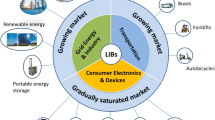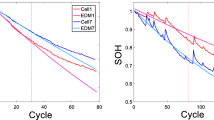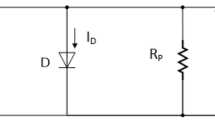Abstract
In the battery management system (BMS), the state of charge (SOC) of lithium-ion batteries is an indispensable part, and the accuracy of SOC estimation has attracted wide attention. Accurate SOC estimation can improve the efficiency of battery use while ensuring battery safety and improving battery life. Taking ternary lithium battery as the research object, this paper proposes a parameter identification method using adaptive forgetting factor recursive least squares and an improved joint unscented particle filter algorithm to estimate SOC. Firstly, an adaptive method is used to select the appropriate forgetting factor value to improve the accuracy of the forgetting factor recursive least squares (FFRLS) method. Meanwhile, the improved particle swarm (IPSO) optimization algorithm that incorporates variable weights and shrinkage factors is utilized to make the best choice of the noise for the unscented Kalman filter (UKF) algorithm in order to improve the estimation accuracy of the UKF algorithm. At the same time, the UKF algorithm is used as the suggestion density function of the particle filter (PF) algorithm to form the unscented particle filter (UPF) algorithm. In this paper, the AFFRLS algorithm and IPSO-SDUPF algorithm are combined to estimate the SOC of Li-ion batteries in real time. Experimental results under different working conditions show that the proposed algorithm has good convergence and high stability for SOC estimation of lithium-ion batteries. The maximum estimation errors of this algorithm are 1.137% and 0.797% for BBDST and DST conditions at 25 °C, and 1.015% and 1.029% for BBDST and DST conditions at 35 °C, which are lower than those of the commonly used algorithms of EKF, SDUKF, IPSO-SDUKF, and SDUPF, and provide a reference for future. The maximum estimation errors are lower than those of the commonly used EKF, SDUKF, IPSO-SDUKF, and SDUPF algorithms, which provide a reference for the future high-precision SOC estimation of Li-ion batteries.




























Similar content being viewed by others
Data Availability
The datasets are not available for this literature review.
References
Wang C, Wang S, Zhou J et al (2023) A novel back propagation neural network-dual extended Kalman filter method for state-of-charge and state-of-health co-estimation of lithium-ion batteries based on limited memory least square algorithm. J Energy Storage 59:106563. https://doi.org/10.1016/j.est.2022.106563
Li Z, Xiong R, Mu H et al (2017) A novel parameter and state-of-charge determining method of lithium-ion battery for electric vehicles. Appl Energy 207:363–371. https://doi.org/10.1016/j.apenergy.2017.05.081
Wang C, Wang S, Zhou J, Qiao J (2022) A novel BCRLS-BP-EKF method for the state of charge estimation of lithium-ion batteries. Int J Electrochem Sci:220431. https://doi.org/10.20964/2022.04.53
Chaoui H, Mandalapu S (2017) Comparative study of online open circuit voltage estimation techniques for state of charge estimation of lithium-ion batteries. Batteries 3:12. https://doi.org/10.3390/batteries3020012
Yu Q, Nie Y, Peng S et al (2023) Evaluation of the safety standards system of power batteries for electric vehicles in China. Appl Energy 349:121674. https://doi.org/10.1016/j.apenergy.2023.121674
Qiao J, Wang S, Yu C et al (2023) A chaotic firefly - particle filtering method of dynamic migration modeling for the state-of-charge and state-of-health co-estimation of a lithium-ion battery performance. Energy 263:126164. https://doi.org/10.1016/j.energy.2022.126164
Duan W, Song S, Xiao F et al (2023) Battery SOH estimation and RUL prediction framework based on variable forgetting factor online sequential extreme learning machine and particle filter. J Energy Storage 65:107322. https://doi.org/10.1016/j.est.2023.107322
Chen X-K, Sun D (2015) Modeling and state of charge estimation of lithium-ion battery. Adv Manuf 3:202–211. https://doi.org/10.1007/s40436-015-0116-3
Fan B, Pu J (2014) State of charge prediction for lithium-ion batteries. Electr Power Compon Syst 42:464–470. https://doi.org/10.1080/15325008.2013.857368
Wang L, Han J, Liu C, Li G (2022) State of charge estimation of lithium-ion based on VFFRLS-noise adaptive CKF algorithm. Ind Eng Chem Res 61:7489–7503. https://doi.org/10.1021/acs.iecr.1c03999
Du J, Liu Z, Wang Y (2014) State of charge estimation for Li-ion battery based on model from extreme learning machine. Control Eng Pract 26:11–19. https://doi.org/10.1016/j.conengprac.2013.12.014
Duan J, Wang P, Ma W et al (2020) State of charge estimation of lithium battery based on improved correntropy extended Kalman filter. Energies 13:4197. https://doi.org/10.3390/en13164197
Liu Z, Dang X (2018) A new method for state of charge and capacity estimation of lithium-ion battery based on dual strong tracking adaptive H infinity filter. Math Probl Eng 2018:1–18. https://doi.org/10.1155/2018/5218205
Lao Z, Xia B, Wang W et al (2018) A novel method for lithium-ion battery online parameter identification based on variable forgetting factor recursive least squares. Energies 11:1358. https://doi.org/10.3390/en11061358
Li J, Ye M, Jiao S et al (2020) A novel state estimation approach based on adaptive unscented Kalman filter for electric vehicles. IEEE Access 8:185629–185637. https://doi.org/10.1109/ACCESS.2020.3030260
Liu S, Cui N, Zhang C (2017) An adaptive square root unscented Kalman filter approach for state of charge estimation of lithium-ion batteries. Energies 10:1345. https://doi.org/10.3390/en10091345
Ma D, Gao K, Mu Y et al (2022) An adaptive tracking-extended Kalman filter for SOC estimation of batteries with model uncertainty and sensor error. Energies 15:3499. https://doi.org/10.3390/en15103499
Zhang S, Guo X, Zhang X (2020) An improved adaptive unscented kalman filtering for state of charge online estimation of lithium-ion battery. J Energy Storage 32:101980. https://doi.org/10.1016/j.est.2020.101980
He H, Qin H, Sun X, Shui Y (2013) Comparison study on the battery SoC estimation with EKF and UKF algorithms. Energies 6:5088–5100. https://doi.org/10.3390/en6105088
Wang J, Meng J, Peng Q et al (2023) Lithium-ion battery state-of-charge estimation using electrochemical model with sensitive parameters adjustment. Batteries 9:180. https://doi.org/10.3390/batteries9030180
Guo X, Xu X, Geng J et al (2019) SOC estimation with an adaptive unscented Kalman filter based on model parameter optimization. Appl Sci 9:4177. https://doi.org/10.3390/app9194177
Wang H, Zheng Y, Yu Y (2021) Joint estimation of SOC of lithium battery based on dual Kalman filter. Processes 9:1412. https://doi.org/10.3390/pr9081412
Lv J, Jiang B, Wang X et al (2020) Estimation of the state of charge of lithium batteries based on adaptive unscented Kalman filter algorithm. Electronics 9:1425. https://doi.org/10.3390/electronics9091425
Zhang C, Li K, Pei L, Zhu C (2015) An integrated approach for real-time model-based state-of-charge estimation of lithium-ion batteries. J Power Sources 283:24–36. https://doi.org/10.1016/j.jpowsour.2015.02.099
Li B, Bei S (2019) Estimation algorithm research for lithium battery SOC in electric vehicles based on adaptive unscented Kalman filter. Neural Comput & Applic 31:8171–8183. https://doi.org/10.1007/s00521-018-3901-7
Meng J, Luo G, Gao F (2016) Lithium polymer battery state-of-charge estimation based on adaptive unscented Kalman filter and support vector machine. IEEE Trans Power Electron 31:2226–2238. https://doi.org/10.1109/TPEL.2015.2439578
Biazi V, Moreira AC, Pinto JL et al (2023) A particle filter-based virtual sensor for estimating the state of charge and internal temperature of lithium-ion batteries: implementation in a simulated study case. J Energy Storage 61:106814. https://doi.org/10.1016/j.est.2023.106814
Xia B, Sun Z, Zhang R, Lao Z (2017) A Cubature particle filter algorithm to estimate the state of the charge of lithium-ion batteries based on a second-order equivalent circuit model. Energies 10:457. https://doi.org/10.3390/en10040457
Zhou D, Zhang K, Ravey A et al (2016) Online estimation of lithium polymer batteries state-of-charge using particle filter-based data fusion with multimodels approach. IEEE Trans Ind Appl 52:2582–2595. https://doi.org/10.1109/TIA.2016.2524438
Peng S, Sun Y, Liu D et al (2023) State of health estimation of lithium-ion batteries based on multi-health features extraction and improved long short-term memory neural network. Energy 282:128956. https://doi.org/10.1016/j.energy.2023.128956
Peng S, Zhang A, Liu D et al (2023) State-of-charge estimation of lithium-ion batteries based on dual-coefficient tracking improved square-root unscented Kalman filter. Batteries 9:392. https://doi.org/10.3390/batteries9080392
Hao X, Wang S, Fan Y et al (2023) An improved forgetting factor recursive least square and unscented particle filtering algorithm for accurate lithium-ion battery state of charge estimation. J Energy Storage 59:106478. https://doi.org/10.1016/j.est.2022.106478
Hong S, Qin C, Lai X et al (2023) State-of-health estimation and remaining useful life prediction for lithium-ion batteries based on an improved particle filter algorithm. J Energy Storage 64:107179. https://doi.org/10.1016/j.est.2023.107179
Zhang K, Ma J, Zhao X et al (2019) State of charge estimation for lithium battery based on adaptively weighting cubature particle filter. IEEE Access 7:166657–166666. https://doi.org/10.1109/ACCESS.2019.2953478
Li Y, Chen J, Lan F (2020) Enhanced online model identification and state of charge estimation for lithium-ion battery under noise corrupted measurements by bias compensation recursive least squares. J Power Sources 456:227984. https://doi.org/10.1016/j.jpowsour.2020.227984
Guo X, Kang L, Yao Y et al (2016) Joint estimation of the electric vehicle power battery state of charge based on the least squares method and the Kalman filter algorithm. Energies 9:100. https://doi.org/10.3390/en9020100
Wei X, Yimin M, Feng Z (2019) Lithium-ion battery modeling and state of charge estimation. Integr Ferroelectr 200:59–72. https://doi.org/10.1080/10584587.2019.1592620
He H, Xiong R, Zhang X et al (2011) State-of-charge estimation of the lithium-ion battery using an adaptive extended Kalman filter based on an improved Thevenin model. IEEE Trans Veh Technol 60:1461–1469. https://doi.org/10.1109/TVT.2011.2132812
Wang Q, Gao T, Li X (2022) SOC Estimation of lithium-ion battery based on equivalent circuit model with variable parameters. Energies 15:5829. https://doi.org/10.3390/en15165829
Sarrafan K, Muttaqi KM, Sutanto D (2020) Real-time estimation of model parameters and state-of-charge of Li-ion batteries in electric vehicles using a new mixed estimation model. IEEE Trans Ind Appl 56:5417–5428. https://doi.org/10.1109/TIA.2020.3002977
Liu X, Zheng C, Wu J et al (2020) An improved state of charge and state of power estimation method based on genetic particle filter for lithium-ion batteries. Energies 13:478. https://doi.org/10.3390/en13020478
Tian Y, Lu C, Wang Z, Tao L (2014) Artificial fish swarm algorithm-based particle filter for Li-ion battery life prediction. Math Probl Eng 2014:1–10. https://doi.org/10.1155/2014/564894
Li M, Zhang Y, Hu Z et al (2021) A battery SOC estimation method based on AFFRLS-EKF. Sensors 21:5698. https://doi.org/10.3390/s21175698
Sun X, Ji J, Ren B et al (2019) Adaptive forgetting factor recursive least square algorithm for online identification of equivalent circuit model parameters of a lithium-ion battery. Energies 12:2242. https://doi.org/10.3390/en12122242
Lai X, Yuan M, Tang X et al (2022) Co-estimation of state-of-charge and state-of-health for lithium-ion batteries considering temperature and ageing. Energies 15:7416. https://doi.org/10.3390/en15197416
Long H-Y, Zhu C-Y, Huang B-B et al (2019) Model parameters online identification and SOC joint estimation for lithium-ion battery based on a composite algorithm. J Electr Eng Technol 14:1485–1493. https://doi.org/10.1007/s42835-019-00179-w
Duan W, Song C, Chen Y et al (2020) Online parameter identification and state of charge estimation of battery based on multitimescale adaptive double Kalman filter algorithm. Math Probl Eng 2020:1–20. https://doi.org/10.1155/2020/9502605
Ouyang T, Xu P, Chen J et al (2020) Improved parameters identification and state of charge estimation for lithium-ion battery with real-time optimal forgetting factor. Electrochim Acta 353:136576. https://doi.org/10.1016/j.electacta.2020.136576
Chen L, Wang S, Jiang H et al (2020) Decreasing weight particle swarm optimization combined with unscented particle filter for the non-linear model for lithium battery state of charge estimation. Int J Electrochem Sci 15:10104–10116. https://doi.org/10.20964/2020.10.41
He G, Wang Z, Ma H, Zhou X (2023) Optimal capacity configuration of wind–solar hydrogen storage microgrid based on IDW-PSO. Batteries 9:410. https://doi.org/10.3390/batteries9080410
Xia G, Wang G (2016) INS/GNSS tightly-coupled integration using quaternion-based AUPF for USV. Sensors 16:1215. https://doi.org/10.3390/s16081215
Funding
The work was supported by the National Natural Science Foundation of China (Nos. 62173281 and 61801407).
Author information
Authors and Affiliations
Contributions
Li was responsible for the article conceptualization, methodology, software, research, formal analysis, and writing-original draft. Wang was responsible for the article’s conceptualization, methodology, resources, and theoretical guidance. Yu was responsible for the linguistic presentation of the article as well as the theoretical guidance. Qi was involved in reviewing the data, revising Figs. 1–4, and adjusting the article presentation. Shen was involved in the validation and collection of experimental data. Fernandez was responsible for the theoretical review, statement checking, and article editing. All authors reviewed the manuscript.
Corresponding author
Ethics declarations
Ethical approval
This is not applicable.
Competing interests
The authors declare no competing interests.
Additional information
Publisher’s Note
Springer Nature remains neutral with regard to jurisdictional claims in published maps and institutional affiliations.
Rights and permissions
Springer Nature or its licensor (e.g. a society or other partner) holds exclusive rights to this article under a publishing agreement with the author(s) or other rightsholder(s); author self-archiving of the accepted manuscript version of this article is solely governed by the terms of such publishing agreement and applicable law.
About this article
Cite this article
Li, Z., Wang, S., Yu, C. et al. An improved adaptive weights correction-particle swarm optimization-unscented particle filter method for high-precision online state of charge estimation of lithium-ion batteries. Ionics 30, 311–334 (2024). https://doi.org/10.1007/s11581-023-05272-9
Received:
Revised:
Accepted:
Published:
Issue Date:
DOI: https://doi.org/10.1007/s11581-023-05272-9




